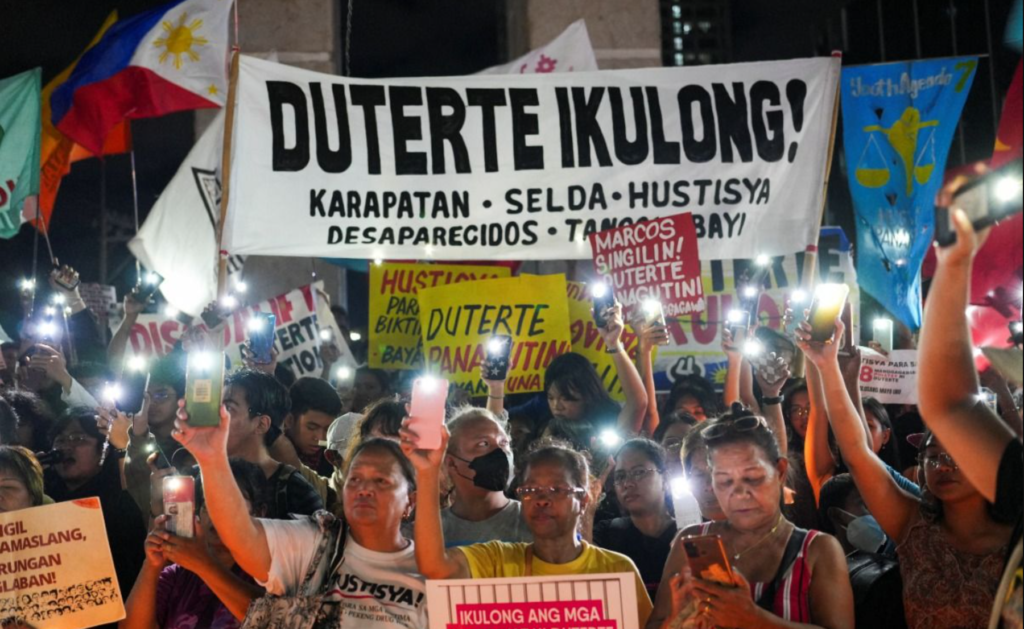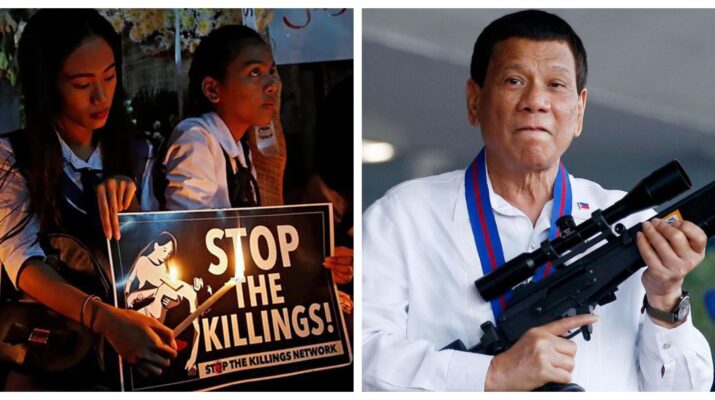What transpired on 11 March 2025 was something few thought possible. Former president Rodrigo Duterte was finally arrested by the Interpol on charges of crimes against humanity by the International Criminal Court (ICC).
Those charges stemmed from his alleged involvement in extrajudicial killings that were “widespread and systematic” from 2011 to 2019, encompassing Duterte’s time both as president and mayor of Davao City. The ICC investigation specifically casts a light on Duterte’s infamous “war on drugs”, a campaign brutal campaign that human rights observers allege to have killed as many as 30,000 people.
Even before 11 March, speculation was rife that the long-awaited arrest warrant from the ICC was impending. When Duterte and his family abruptly flew to Hong Kong on the 7th, many saw that as confirmation of the rumors; it was thought that Duterte caught wind of his imminent arrest and attempted to evade arrest.
This theory was supported by the fact that aside from his common-law wife and their daughter, Duterte’s entourage to Hong Kong was composed of lawyers, retired law enforcement officials and former officers in the intelligence service. It was an odd composition of people given that the cover story provided by the Duterte camp was that the former president was merely attending a campaign rally in the former British protectorate, for his PDP-Laban party.
When Duterte was en route to the Philippines however, it was confirmed that he would be arrested by Interpol agents upon his arrival. That is exactly what happened, with the former president being brought to Villamor Air Base – right next to the international airport his flight landed on – after being apprehended.
The precision and planning of his arrest quickly dawned on Duterte and his associates, within hours he was placed on a private jet bound for The Hague, where the ICC is located. From being a virtual “untouchable” whose arrest was unthinkable, given the power and connections he and his family wielded in the Philippines, Duterte was now a bona fide detainee in a foreign country – where his connections and family influence can do nothing for him.
Overcome by a sense of helplessness, the former president’s family and supporters can only cry foul regarding his arrest – calling it illegal. Duterte’s sympathizers raised a host of issues with his arrest, from the alleged lack of jurisdiction of the ICC to the impropriety of the arrest itself.

Despite their outcry, these sympathizers have to contend by the fact that Duterte’s arrest was meticulously planned so as not to fall afoul of arrest protocols. The fact that the once-powerful former president could fall into the hands of Interpol and be put on a plane to be expatriated to the Netherlands immediately, tells us that the entire operation was intricately choreographed by the Philippine government, the Philippine National Police (PNP) and their Interpol counterparts.
Given how intricately it was implemented, it’s hard to think that authorities would risk seeing Duterte released on a technicality by violating his right to due process. The entire ordeal was also well-documented, thanks to Duterte’s own supporters who filmed his arrest on their phones in hopes of garnering sympathy from the Filipino public.
Inadvertently, those recordings instead proved there was no impropriety in Duterte’s arrest. Footage showed Criminal Investigation and Detection Group (CIDG) director, Maj. Gen. Nicolas Torre, reading the former president his Miranda rights and dictating the details of the arrest warrant.
Duterte was also secured in a spacious facility, surrounded by family and at least three lawyers including his former executive secretary – Salvador “Bingbong” Medialdea. The former president was then loaded into the chartered jet for The Hague without any force and was not handcuffed.
Not only are these indications that there were no violations made to his human rights, this also showed that Duterte was apprehended more generously than the victims of his so-called “war on drugs”. Many victims of his brutal crackdown on illegal drugs were not afforded due process – no warrants, no reading of their Miranda rights, and many did not even get to live to see a day in court.
![Former president Rodrigo Duterte (seated middle row left) inside the private plane chartered to expatriate him to The Hague, Netherlands. With him is his lawyer and former executive secretary, Salvador Medialdea (seated right, in black). [Photo: ABS-CBN News]](https://thedefiant.net/wp-content/uploads/2025/03/Photo-FPRRD-chartered-plane-The-Hague-1024x681.png)
Arnaiz’s friend, Reynaldo “Kulot” de Guzman, was only 14-years old when they both went missing. His body would be found three weeks later in Nueva Ecija – three hours away from where Arnaiz’s body was found – and bore 30 stab wounds with his head wrapped in packaging tape.
The story of both Arnaiz and De Guzman’s deaths have long been questioned by their families and human rights advocates. After an investigation by the courts it was determined that the police responsible had falsified their narration of events, tortured the victims, and even planted narcotics on their bodies to bolster the claim that the two teenagers were drug addicts and violent criminals.
The stories of Carl Arnaiz and Kulot de Guzman are only snippets of an overarching theme of innocent bystanders being wrongfully accused of drug-related crimes by the police during the so-called “war on drugs”. Not only were they innocent, but they also were not afforded the opportunity to prove their innocence in court.
The treatment of those victims are nothing like the reception Rodrigo Duterte received during his arrest. In a few days, the former president will appear before the ICC for his initial appearance – an opportunity many of his victims could have only dreamed of.

